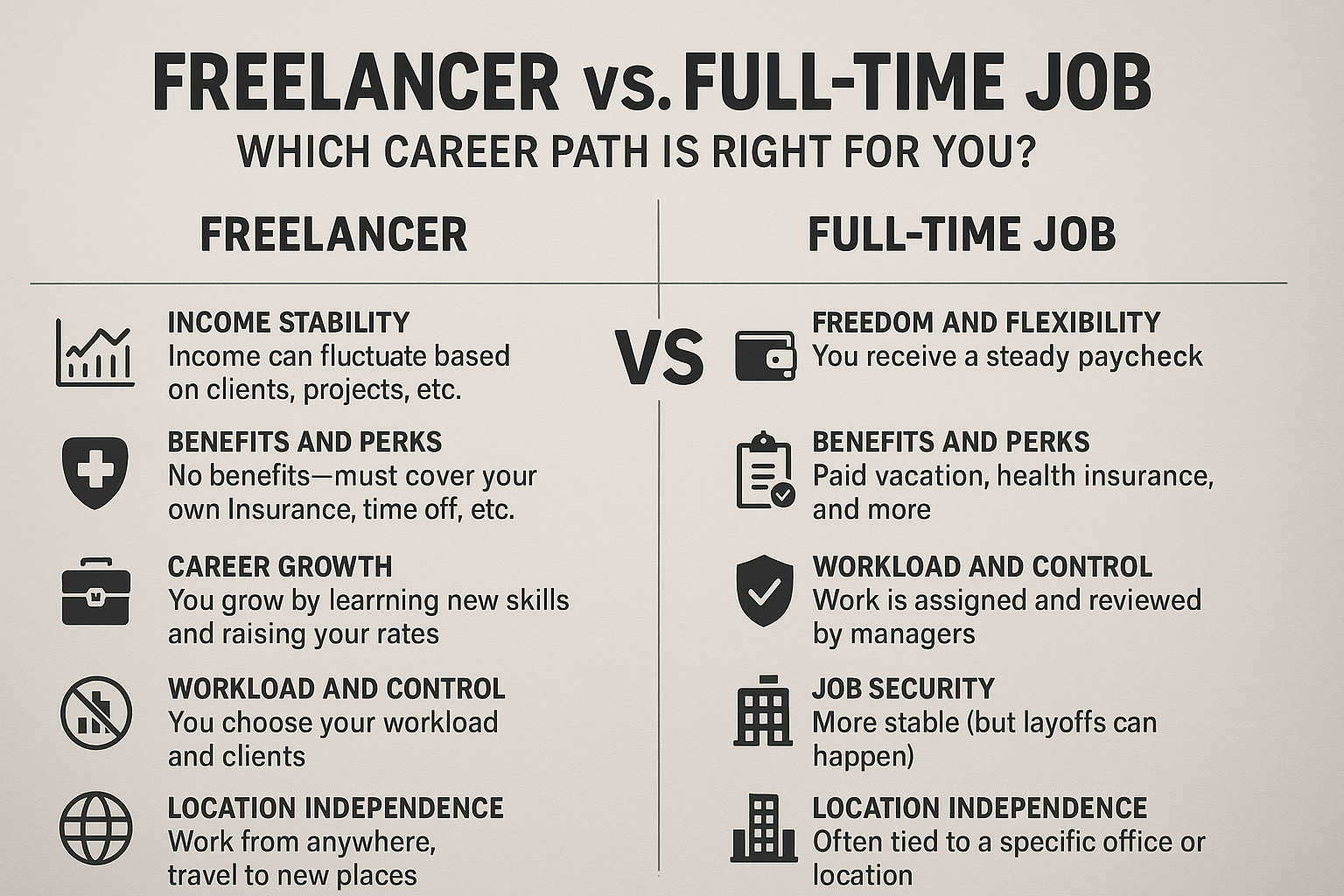As the world of work evolves, more professionals are choosing between two very different paths: freelancing or working a full-time job. Each offers distinct advantages and challenges, and the right choice depends on your goals, personality, and lifestyle. In this article, we’ll break down the key differences between freelancing and traditional employment to help you decide which path suits you best.
What Is a Freelancer?
A freelancer is a self-employed professional who offers services to clients on a project, contract, or hourly basis. Freelancers typically work for multiple clients and are responsible for finding work, managing their time, and handling their business operations.
Common freelance fields include:
- Writing and content creation
- Graphic and web design
- Software development
- Marketing and social media
- Translation and transcription
What Is a Full-Time Job?
A full-time job generally means working for one employer on a long-term basis, usually 35–40 hours per week. Employees receive a fixed salary and benefits in exchange for their work, and their tasks are defined by their role in the organization.
Industries for full-time roles range from administration to healthcare, tech, finance, and more.
Key Differences Between Freelancing and Full-Time Employment
Let’s explore how each path compares across major categories:
1. Income Stability
- Full-Time Job: You receive a steady paycheck, making it easier to budget and plan long term.
- Freelancing: Income can fluctuate based on the number of clients, projects, and payment schedules.
✅ Best for: People who value financial consistency.
2. Freedom and Flexibility
- Full-Time Job: Work hours, location, and tasks are usually fixed by the employer.
- Freelancing: You control your schedule, where you work, and which projects you take on.
✅ Best for: People who want independence and flexible work-life balance.
3. Benefits and Perks
- Full-Time Job: Includes paid vacation, health insurance, retirement plans, and other perks.
- Freelancing: No built-in benefits. You must purchase your own insurance and plan for time off.
✅ Best for: People who value security and structured support.
4. Career Growth
- Full-Time Job: Offers structured paths for promotion, mentorship, and leadership roles.
- Freelancing: You grow by learning new skills, raising your rates, or starting your own agency—but it requires self-motivation.
✅ Best for: Self-starters and entrepreneurial minds.
5. Workload and Control
- Full-Time Job: Your workload is assigned and reviewed by managers.
- Freelancing: You decide how much to take on—but must handle everything yourself (clients, billing, marketing, etc.)
✅ Best for: Those who enjoy autonomy and multitasking.
6. Job Security
- Full-Time Job: More job security in stable companies, though layoffs can still happen.
- Freelancing: Less predictable—but building a strong client base can provide long-term stability.
✅ Best for: People who thrive on adaptability and networking.
7. Location Independence
- Full-Time Job: Often tied to a specific office or location, unless remote options are provided.
- Freelancing: Work from anywhere, including while traveling (digital nomad lifestyle).
✅ Best for: People who love freedom and travel.
Pros and Cons Summary
| Category | Freelancing | Full-Time Job |
|---|---|---|
| Income | Flexible, scalable | Fixed, stable |
| Schedule | Flexible | Fixed |
| Benefits | Self-managed | Employer-provided |
| Growth | Self-driven | Structured |
| Job Security | Variable | Higher |
| Workload | You control | Employer decides |
| Location | Anywhere | Office or remote |
Who Should Consider Freelancing?
Freelancing might be the right fit if you:
- Prefer working independently
- Want control over your time and career direction
- Have a marketable skill and entrepreneurial spirit
- Are comfortable with some financial risk and uncertainty
- Want to pursue multiple passions or projects
Who Should Choose a Full-Time Job?
A traditional job might suit you if you:
- Prefer consistency in income and benefits
- Thrive in structured environments with defined roles
- Value mentorship and collaborative teams
- Don’t want the stress of managing a business
- Are just starting and want to gain experience
Can You Do Both?
Yes—many professionals are hybrid workers, combining a full-time job with freelance projects (a side hustle). This path:
- Offers income security
- Helps you build experience
- Prepares you for a future switch to full-time freelancing
Just make sure your job contract allows outside work and manage your time carefully to avoid burnout.
Final Thoughts: Choose Based on Your Goals
There is no one-size-fits-all answer. Both freelancing and full-time work can be fulfilling and lucrative. The key is to:
- Understand your personal and financial needs
- Assess your risk tolerance and work style
- Try both paths if you’re unsure
At different stages of your life or career, your preference may shift—and that’s okay. The future of work is flexible, and your career can be too.

